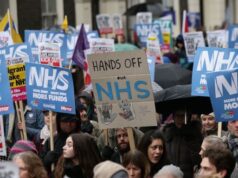Mental Health Services in Crisis: Not Enough Nurses, Psychiatrists and Specialist Beds – and It’s Getting Worse
+ 2009 – 2018: 6,800 mental health nurses were lost
+ 20% fewer specialist psychiatric doctors in training
+ 2009 – 2018: beds for patients with serious mental health issues fell by 8,000
+ 75% of young people with mental health issues get worse before they receive treatment
+ 2009 – 2018: a 47% increase in the number of people detained under the Mental Health Act
+ 100,000 vacancies in NHS and Local Authority social care services
Figures courtesy of ‘M.D.’ in ‘Private Eye’ 23 August 2019 (Dr Phil Hammond).
Incidence of Mental Health Problems Linked to Poor Air Quality in Polluted Areas
Research has been recently published which indicates a strong link between poor air quality and the increased risk of bipolar disorder, severe depression and schizophrenia. Researchers used a US health insurance database of 151 million individuals with 11 years of inpatient and outpatient claims for mental illness. Data on 1.4 million patients in Denmark was also analysed. The latter data revealed that the rate of schizophrenia doubled amongst those exposed to poor air quality during early childhood.
Although all experts do not agree with the findings, the Royal College of Psychiatrists said that the research ‘builds on the increasing evidence of a link between air pollution and the development of mental illness’.
These findings will anger and exasperate residents of Hayes and Southall who have been subject to odour and air pollution since May 2017. The source of the 24 hour pollution is Berkeley Group and Ealing Council’s implementation of soil ‘cleaning’ initiatives on the Southall Gas Works site where some 10,000 new residents will occupy 3,750 new homes over the next decade.
Hospital Bed Reduction Programme is Relentless – 7,200 Over the Next 12 Months
It’s common knowledge that the cost of patients spending days and nights in hospital is very high. However there are times when a hospital stay is the only safe and viable option. With more of us living longer and having multiple physical and mental illnesses in our old age, surely we need to increase the number of hospital beds? But apparently not. A new NHS target has emerged to free up 7,200 beds nationally over the next 12 months.
Anecdotal research last year revealed that major causes of ‘Delayed Discharge’ (or bed blocking in the vernacular) at Ealing Hospital were elderly patients who were getting better and seriously ill mental health patients. The former had to stay in their bed because no arrangements could be made for them to be safely cared for at home or in mythical ‘community care’. As for the seriously mentally ill there were consistently no specialist mental health beds available.
Some of Our Hospitals and GP Surgeries are Toxic
‘The Times’ of 19 August 2019 reports that The British Lung Foundation has discovered that 248 (17%) of our NHS hospitals in England have dangerous levels of air pollution. The toxicity level being breached is the World Health Organisation’s (WHO’s) 10 micrograms per cubic metre of air (mcg/m3) of fine particles (PM2.5). These particles are tiny and can penetrate deep into the lungs and enter the blood stream.
Lowestoft Hospital fared the worst at 16.18 mcg/m3. 72% of all London NHS hospitals are in breach of the WHO standard of 10, as are 2,100 GP surgeries throughout England. Ealing Hospital (10.21) and West Middlesex Hospital (10.0) are in breach as is my own Hanwell GP surgery – Elthorne Park (10.32).
GP Surgeries to be Fined £40,000 for Closing for Four Hours Each Week
The ‘Daily Mail’ (who else?) on 19 August 2019 exclusively revealed that NHS England (NHSE) is putting GPs under even greater pressure by fining them £40,000/year for weekly half day closing. Apparently if GP Surgeries want to close for training they have to ask their CCG for permission.
NHSE has, apparently, invested time and resources to discover that 10% of GP surgeries in England close for four hours during day time every week. As it is, the weekday opening hours of 8:00am to 6:30pm are longer than most Local Authorities and most medium to large businesses.
This Draconian measure comes at a time when many GPs are contemplating early retirement; some newly qualified GPs are being tempted to go and work in Australia and New Zealand; and some GPs are going part time because of workload and stress.
This is not carrot and stick by NHSE – it’s stick and stick.
I got the chance to ask Dr Raj Patel in public on 20 August 2019 why NHSE was doing this. This Deputy Medical Director for Primary Care NHSE/NHSI passed off my question quite glibly and said that half day closing was an outdated anachronism. When I tried to follow this up by asking if it was true that if GP surgeries wanted to close for a few hours for training they had to get permission from their CCG – the microphone was taken from me…
Could ‘Social Prescribing’ Help Patients – Or Will it Prove To Be a Damp Squib?
In the January 2019 NHS Long Term Plan (LTP) there are proposals for 1,000 ‘Social Prescribing Link Workers’ (SPLWs) to be employed by the 1,000+ LTP defined Primary Care Networks (PCNs). SPLWs will attempt to help patients access activities and services that provide a more effective alternative to medicine. Examples quoted include referrals to community services, which could offer access to social, fitness or arts and culture initiatives. PCNs will get 100% re-imbursement for hiring a SPLW.
The first thing that occurs to me is that the role of the SPLW is possibly already being carried out by other ‘workers’. To some extent, Local Authority social workers and NHS mental health Trust psychologists and mental health workers will all be attempting to devise and help implement patients’ coping strategies through ‘social prescribing’.
Secondly, exactly who will these 1,000 workers be? What training or qualifications will be required of them? If they are in work now, won’t they leave a ‘hole’/vacancy in, for example, a Local Authority’s social services team?
That being said, SPLWs could provide some valuable services if there were enough of them. One SPLW working for my Hanwell PCN (five GP surgeries and 35,000 patients) would be spread quite thinly. In Acton – with a PCN of 15 GP surgeries and 77,000 patients – one SPLW could actually achieve very little. Maybe Acton PCN will hire five SPLWs. But where would it house them? Surely PCNs won’t have capital budgets for premises?
‘Team London Small Grants’ are now available for voluntary projects that help people who are experiencing loneliness and social isolation. Receiving a small grant might enable a volunteer group to respond effectively to a patient referred by a SPLW. Search for ‘Team London Small Grants’ at www.london.gov.uk. Deadline for applications is 13 September 2019.
Only time will tell whether PCNs will hire SPLWs who will enable needy patients to engage with social, sports, arts and cultural initiatives.
Prue Leith is the Latest TV Celebrity Chef to Lend Her Name to Improving NHS Hospital Food
The Health and Social Care Secretary Matt Hancock MP announced in June 2019 a comprehensive review of hospital food sourcing and preparation. In order no doubt to publicise this initiative further it was announced in August 2019 that Prue Leith, TV’s ‘The Great British Bake Off’ judge is to advise the Government.
No doubt somewhat related to these food improvement initiatives is the fact that 18 people have died this year in NHS food related incidences of listeria and streptococcus. Recently six UK hospital patients died after eating pre-packed sandwiches contaminated with listeria supplied to the NHS. 12 Mid Essex NHS patients died from streptococcus infections.
This isn’t the first NHS food improvement initiative involving ‘famous’ chefs in recent years. In 2000, TV chef Lloyd Grossman was hired by the NHS to train hospital chefs. In 2005 it was Jamie Oliver’s turn to get into the act. This time it was via embarrassing the Government over State school dinner offerings. In 2014 it was James Martin fronting the ‘Operation Hospital Food’ BBC1 TV series. Finally TV chef Ainsley Harriott joined other celebs in the 2015 NHSE/Public health England ‘Stay Well this Winter’ initiative.
The burning question of course is whether these celeb-led initiatives actually led to improved hospital food. What’s probably needed is more money for modern food preparation equipment in hospitals. We also need better trained and rewarded food sourcing and preparation staff, enlightened fresh food selection policies and an end to all aspects of outsourcing with regard hospital food.




